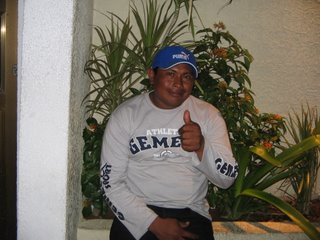Wednesday, September 13, 2006
Maracuchos
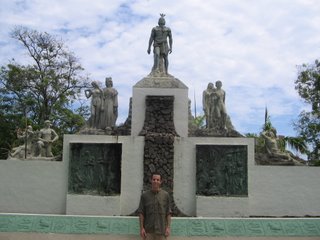 The people in this picture were hanging around under an awning. The guy sitting in the orange chair carried a satchel with various brands of cellular phones in it and you could pay him some money to use them for an agreed upon period of time. This guy is said to work in the 'informal sector,' meaning that he doesn't have a job with an established, tax-paying company. About half of the people in Venezuela survive by working in this sort of cottage industry.
The people in this picture were hanging around under an awning. The guy sitting in the orange chair carried a satchel with various brands of cellular phones in it and you could pay him some money to use them for an agreed upon period of time. This guy is said to work in the 'informal sector,' meaning that he doesn't have a job with an established, tax-paying company. About half of the people in Venezuela survive by working in this sort of cottage industry.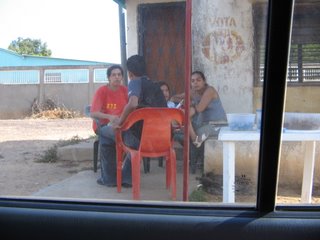 This is a view of the street in the district where I have been living. The neighborhood is called "Barrio Nueva Via." I live in the house with the awning that can be seen at the far right of the photo, behind the blue car. The neighborhood is an ethnic mix, with people of many South American nationalities living together. Most people here live with their entire extended family under one roof. Lots of people work construction when they can get jobs or scratch out a living in the informal sector. The young men play soccer in the street a few nights a week. It's a pity I suck at soccer - my bro Dan would be well suited to live here.
This is a view of the street in the district where I have been living. The neighborhood is called "Barrio Nueva Via." I live in the house with the awning that can be seen at the far right of the photo, behind the blue car. The neighborhood is an ethnic mix, with people of many South American nationalities living together. Most people here live with their entire extended family under one roof. Lots of people work construction when they can get jobs or scratch out a living in the informal sector. The young men play soccer in the street a few nights a week. It's a pity I suck at soccer - my bro Dan would be well suited to live here.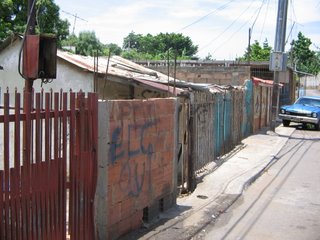
This is a picture of the hallway inside of the house where I live. The doorway to the right leads to my room, which has its own bathroom and AC unit! The lady in the background is Sra. Socorro, who is the wonderful grandmother of the house. Her husband Sr. Tito also lives here, along with two of their children, and two granchildren. They are Peruvian, so they know how it feels to be tranplanted to the foreign Maracucho culture. They feed me good food three meals a day. I am borrowing Sra. Socorro's cell phone for the next ten months because she hates it and is generous. This family has told me where and what to eat and drink and where it is safe to go during the day at night; they have taught me how to navigate around the city; they teach me vocabulary constantly. Without them, my experience in this new place would be far poorer.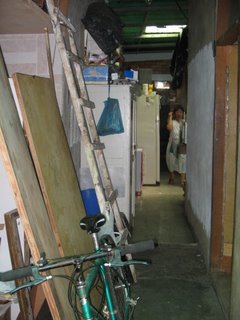
This is a picture of me with a 105 year old woman named Sra. Martina who lives four houses down from the Peruvians. She claims to be 108, but her son-in-law told me otherwise. She was born in a city called San Joaquin in Falcon State, Venezuela in 1901. She is a poet and has published several books of devotional catholic poetry. Her favorite topic is the famous Saint of Maracaibo, La Chinita. Sra. Martina can still hear, though she is largely blind. She recited some of her poetry for me from memory. She spends her days sitting in front of a fan in her bedroom remembering poetry and moving a worn string of rosary beads through her hands. Sra. Martina insisted on standing for the photograph.
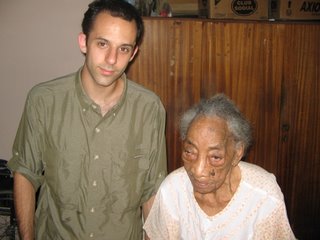
This is Emeka from Nigeria. I met him through a co-worker at CEVAZ (the binational center where I work). He too was looking for an apartment, so we met up to see if we could find a place to split. He found a place during our search, but it only had room for one person. In the course of our time together, he told me some of his story. Emeka came here 10 months ago, planning to stay for a brief time before securing a Visa to Canada. Unfortunately, he got mugged almost immediately after arriving and lost nearly everything. He was forced to live in a very bad part of Maracaibo until he found a decent job working at this Arab restaurant. He told me that he had to fight off muggers nearly every night where he was living, so he was extremely relieved when he found a new place to live. Emeka went out of his way to help me find my own apartment. He understands painfully well how tough it can be to survive in this country. He told me that he wants there to be people here who can vouch for his goodness, and he hoped that by helping out others, word would spread that he is a good man. Thus did a Nigerian stuck in Venezuela explain his own theory of Karma.
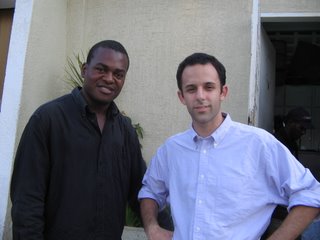
One of Emeka's friends was supposed to come pick me up at the Arab restaurant where Emeka works at 6:00 PM to take me to an excellent apartment available for rent. In typical Maracucho fashion, the guy was one, two, three hours late and ended up not showing up at all. During my wait, I wrote a poem. I started talking to some of the employees at the restaurant, and this guy, Victor, had an interest in poetry. He spent an hour edting my poem and he taught me a bunch of cuss words in Maracucho. I would write them here with translations, but the words are really quite rude. If you want to hear them, ask me, and I will cuss you out in Maracucho.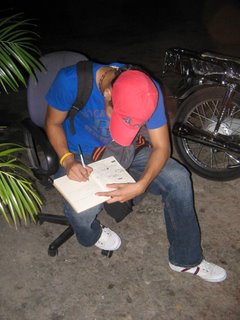
Loitering right near Victor was this guy, Daniel, who is a Guajiro Indian who works at a club across from the restaurant where I was hanging out. We talked about medicinal plants. He told me that it is possible to make a medication of the ground leaves of the plant to his right to help cure headaches. The flowering plant immediately behind him is good for the stomach. The plant above him and to the left is not native or he did not know what it was useful for. Daniel said that he knows the uses of around 60 common plants, but that there are other people who know thousands. He lives in Maracaibo, as do many other Guajiro, but he has relatives who live in the forest along the porous border with Colombia.
That's all for now. Next time: an art show, some offensive graffiti, a drunken night out with the vice-consul of Colombia, a Catholic mass, and whatever other odd things happen to me between now and the next post. I miss you all.
